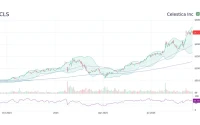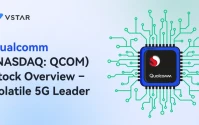It’s a familiar pattern, one that plays out with predictable regularity on Wall Street. A legacy tech company, solid but unexciting, releases a forward-looking statement. The language is optimistic, the timeline is long, and the specifics are… flexible. In response, the market, starved for a simple, positive narrative, sends the stock soaring. This week, Dell Technologies played the starring role in this well-rehearsed production.
The company’s stock enjoyed a significant pop after management publicly revised its long-term revenue growth expectations upward. On the surface, this is textbook good news. A company signals confidence in its future, and investors reward that confidence with capital. But my job isn't to applaud the headline, such as Dell stock pops as company ups long-term revenue growth expectations; it's to dissect the mechanism behind it. The immediate question isn't whether the news is good, but whether the market's reaction is proportional to the actual substance of the announcement.
A Signal Without a Source Code
Let’s be clear about what "long-term revenue growth expectations" are. This isn't the same as quarterly guidance, which is a concrete, near-term forecast against which the company will be harshly judged in a matter of months. This is a strategic target, a destination plotted on a map for a journey that will take years. It’s an ambition, not a contractual obligation. Changing this number is less like reporting a new data point and more like adjusting the difficulty setting in a video game you haven't started playing yet.
This is the corporate equivalent of a politician promising a utopian future without offering a single piece of legislation. It feels good, it generates enthusiasm, but it lacks the granular, verifiable detail that constitutes actual data. The market’s reaction suggests it’s treating this forecast as a high-probability outcome. But what is this new, higher growth rate actually predicated on? Is it a revolutionary new product line that’s about to launch? A massive, untapped market they’ve just unlocked? Or is it an adjustment on a spreadsheet, driven by modeling assumptions that can be changed again next year? The reports on the stock move are conspicuously silent on the underlying drivers.

And this is the part of the cycle that I always find fascinating from a data analysis perspective. We see a powerful market reaction—the effect—but the publicly available information on the cause is vague at best. Was this guidance adjustment tied to the booming AI server business, a sector where Dell is a major player? If so, by how much? What are the projected margins on that growth? Without these numbers, we're essentially trading on sentiment. We're betting on the corporate storyteller, not the balance sheet.
The Weight of a Narrative
The market doesn't operate in a vacuum. The surge in Dell’s stock—let’s be precise, it touched a high of 8.2% in pre-market trading before settling—happened in a climate of broader uncertainty. With a government shutdown suspending the release of key economic data, investors are grasping for any clear signal they can find. In an information vacuum, a strong corporate narrative becomes disproportionately powerful. Dell provided one.
The company is a known quantity. It’s a massive, established player in enterprise hardware. This isn't a speculative biotech firm or a pre-profit startup. For an institutional investor, a positive signal from a company like Dell feels safer and more tangible than trying to decipher macroeconomic tea leaves. The problem is that this safety might be an illusion. The stock's movement is a correlation to the announcement, but is it causation? Or is it just a reflection of pent-up capital looking for a plausible story to latch onto?
What I find most telling is the lack of skepticism. A long-term target (a non-binding target set years into the future) is, by its very nature, a low-information statement. Yet, it was treated as a high-conviction signal. It begs the question: is the market rewarding Dell for its future potential, or is it simply rewarding the communications department for crafting a perfectly timed, sentiment-boosting press release? How much of that stock pop was durable, fundamental value and how much was algorithmic trading responding to keywords?
A Reaction in Search of a Reason
Ultimately, the pop in Dell’s stock feels like an exercise in narrative over numerics. The market reacted to a simple, digestible story: "Dell is growing faster than we thought." But the data supporting that story remains largely aspirational. This isn't to say Dell won't achieve its new targets. It very well might. But today’s price action wasn't a sober analysis of that probability. It was an impulsive, sentiment-driven response to a well-told tale. The real test won't be in the next trading session, but in the quarterly earnings reports over the next three to five years. That’s when we’ll see if this week's optimism was built on a solid foundation or just thin air.









